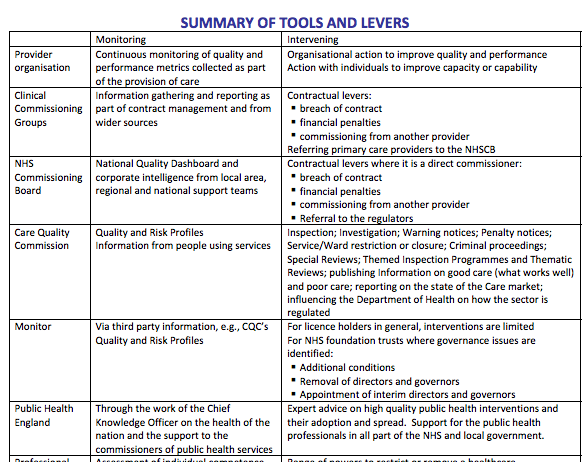If you want to get an overview of the different parties involved in the new health system and their roles – including some new players as well as old players with new responsibilities – a recent report from the National Quality Board‘s (NQB) is worth a look.
Quality in the Health System (PDF) was published to provide context to the establishment of Quality Surveillance Groups, but alongside the guidance there’s lots of very useful context for those getting to grips with the new system.
The document outlines the role of the NQB (“leaders of the national system of commissioning, regulation and performance monitoring”) but also, from page 25, the roles and responsibilities of various actors in the health system.
These provide a useful list of possible sources of information in any health-related investigation, and include providers, commissioners, regulators, and others:
- Health and care professionals (“whether they work in a large acute hospital, a care home, in general practice or in providing community care, and whether they are employed by a public sector, private or not‐for‐profit organisation”)
- Clinical leaders (“anyone who has a leadership role in respect of health and care professionals, such as the Medical and Nursing Directors, the consultant body, clinical managers, the matrons/sisters at ward level or team leaders in care homes”)
- Provider leaders (“partnerships, boards or their equivalents … including the executive and non‐executives in leadership roles”)
- Governors (for NHS foundation trusts)
- Clinical commissioning groups (CCG)
- Local authority commissioners
- NHS Commissioning Board (NHSCB)
- Care Quality Commission (CQC) – the regulator of health and adult social care providers in England – and Healthwatch (a series of local and national CQC committees)
- Monitor – the “sector regulator” of healthcare from April 2013
- Professional regulators (bodies such as the Nursing and Midwifery Council, the Health Professions Council, etc.)
- NHS Trust Development Authority (NHS TDA) – responsible for “performance managing” NHS trusts
- National Institute for Health and Care Excellence (NICE) – responsible for providing national guidance and standards on treatment, prevention and health promotion.
- Public Health England (PHE) – a new body providing “national expertise” to support local government
- Health Education England (HEE) – “responsible for ensuring that the right numbers of health professionals are trained ‐ with the right skills and behaviours” and Local Education Training Boards (LETBs), which put that training into action
- Health Service Ombudsman – which investigates complaints
- Department of Health (DoH) – responsible for the overall working of the health system
There’s also a very useful ‘Summary of tools and levers‘ on page 50 (see image at top) which provides an overview of how different bodies are monitored, and how and where intervention might occur.
